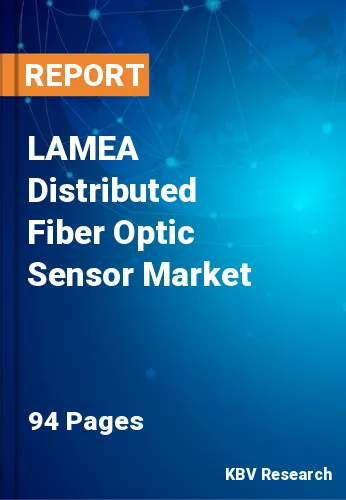The Latin America, Middle East and Africa Distributed Fiber Optic Sensor Market would witness market growth of 10.8% CAGR during the forecast period (2021-2027).
The growing demand for high-level infrastructure and the increasing per capita income are estimated to direct the urban mobility, industrial automation, and growth in luxurious residential projects. There are many governments that are aiming on preserving their current infrastructure and making new ones. It is because they are facing consistent pressure to offer the basic amenities, infrastructure, and connectivity to people. It further contributed to the increased spending on projects, like railways, roads, and dams. This swift growth in the improved civil engineering sector is projected to bolster the development of the market.
The broad variety of uses of DFOS has motivated the manufacturers & suppliers to spend more on R&D to provide advanced & improved products to their customers. There are many service providers which are attempting to control efficiencies and maximize their manufacturing process to acquire the largest market share and remove other alternatives of the fiber optics technology. The huge production & installation cost attached to DFOS products is motivating the manufacturers to make affordable and dependable optic inspection products. Technological glitches combined with other challenges increase the cost of fiber optics deployment, thereby slowing down the growth of the market.
Various countries like Saudi Arabia and Iran, which are the leading countries in the oil and natural gas reserves, would open new growth prospects for the key market players. The mature market of the oil & natural gas industry in this region would attract more companies of distributed fiber optic sensor market to establish in this regional market. In addition, the increasing adoption of distributed fiber optic sensors in various industries would create more demand for these sensors in the market.
The oil & natural gas industry is a major user of these sensors as they are more reliable and accurate for various measurements and transmit the signals without any intervention. Companies are getting more aware of the benefits of using these sensors, thus increasing the demand for the distributed fiber optic sensors in this region. All such factors are supporting the growth of the regional market.
The Oil & Gas market dominated the Saudi Arabia Distributed Fiber Optic Sensor Market by Vertical 2020, thereby, achieving a market value of $5.3 million by 2027. The Power & Utility market is estimated to grow at a CAGR of 10.4% during (2021 - 2027). Additionally, The Safety & Security market is expected to witness a CAGR of 11.6% during (2021 - 2027).
Based on Technology, the market is segmented into Raman Effect, Brillouin Scattering, Rayleigh Effect, Interferometric, and Others. Based on Application, the market is segmented into Temperature Sensing, Acoustic/Vibration Sensing and Others. Based on End User, the market is segmented into Oil & Gas, Power & Utility, Safety & Security, Industrial, Civil Engineering and Others. Based on countries, the market is segmented into Brazil, Argentina, UAE, Saudi Arabia, South Africa, Nigeria, and Rest of LAMEA.
Free Valuable Insights: The Global Distributed Fiber Optic Sensor Market is Predict to reach $1.9 Billion by 2027, at a CAGR of 8.5%
The market research report covers the analysis of key stake holders of the market. Key companies profiled in the report include of Fujikura Ltd., Furukawa Electric Co., Ltd., Bandweaver Technologies Ltd., Yokogawa Electric Corporation, Halliburton Company, Schlumberger N.V., Weatherford International PLC, Luna Innovations, Incorporated, Omnisens SA, and Terna SpA (BruggKabel AG).
By Technology
By Application
By End User
By Country
Our team of dedicated experts can provide you with attractive expansion opportunities for your business.

